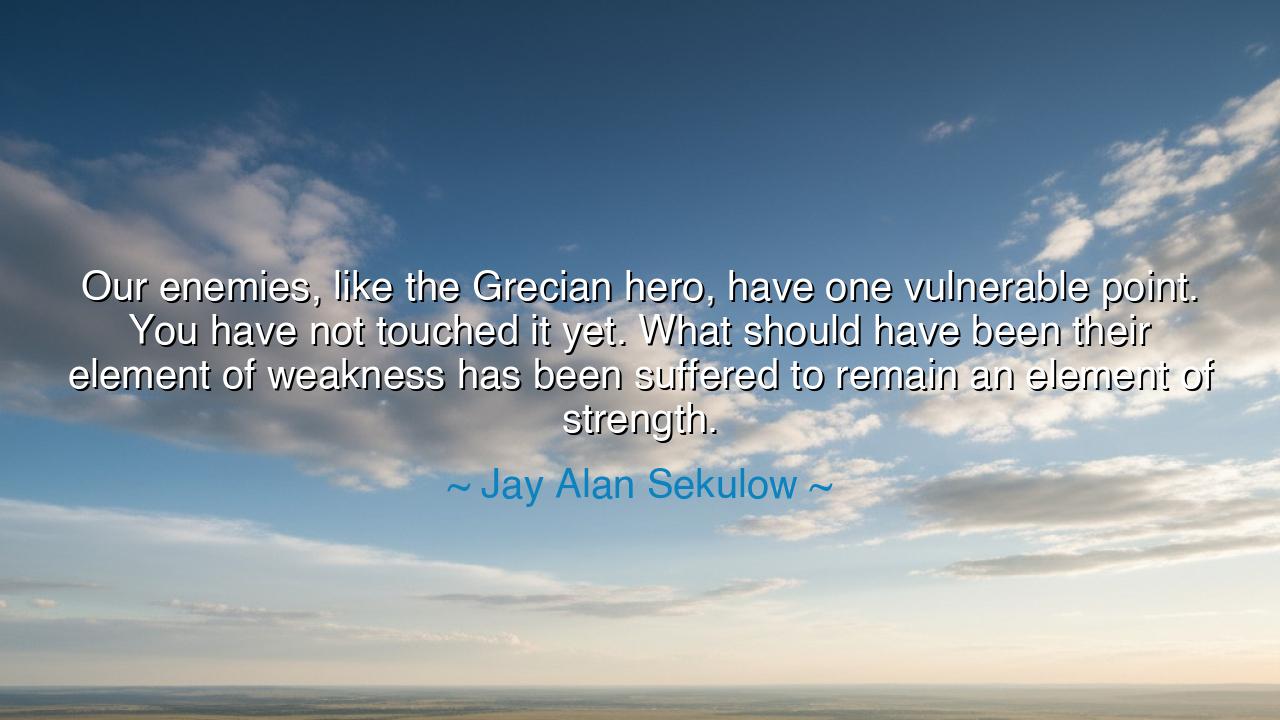
Our enemies, like the Grecian hero, have one vulnerable point.
Our enemies, like the Grecian hero, have one vulnerable point. You have not touched it yet. What should have been their element of weakness has been suffered to remain an element of strength.






Jay Alan Sekulow’s words, “Our enemies, like the Grecian hero, have one vulnerable point. You have not touched it yet. What should have been their element of weakness has been suffered to remain an element of strength,” summon the ancient imagery of Achilles, whose body was invulnerable save for his heel. In this statement lies both wisdom and warning: every adversary, however mighty, bears some hidden weakness. But if that weakness is neglected, if it is not pressed or revealed, then it may become a bastion of power instead, and the struggle against them will grow longer, harder, and more costly.
The origin of this thought reaches back into the ancient world of Homer and myth. The Greeks knew that every hero, no matter how glorious, carried within himself a flaw, a fragile seam in the armor of destiny. Achilles’s heel became the eternal symbol of vulnerability hidden beneath apparent invincibility. Sekulow draws upon this ancient wisdom to remind us that in every conflict—be it war, politics, or life—victory does not come by striking blindly, but by discerning and seizing the enemy’s true point of fragility. To overlook it is to grant them continued strength where they should falter.
History gives us many examples of this principle. Consider Hannibal, the Carthaginian general who struck fear into the Roman Republic with his genius and his elephants. For years, he seemed unstoppable, a terror upon the fields of Italy. Yet Rome discovered his vulnerable point: his supply lines were fragile, his homeland unprotected. By striking Carthage itself, Rome forced him to abandon Italy, and at Zama he was defeated. His seeming invincibility was undone when his true weakness was finally touched.
So too in the life of Napoleon Bonaparte. For years he seemed like an emperor fated never to fall, sweeping across Europe with unmatched brilliance. Yet his Achilles’ heel was pride and overextension. When he marched into Russia, believing himself unconquerable, he found instead that the vast cold and empty land was his undoing. The very terrain, which should have been his enemy’s weakness, was allowed by his blindness to become their greatest strength, until his armies froze and faltered in retreat.
Sekulow’s warning is not only for nations and armies, but also for the soul. Our inner enemies—fear, temptation, despair—too have their vulnerable points. They are not unassailable, though they may appear so. Yet if we do not discern where they may be broken, we allow them to grow stronger, to reign over us, turning what could have been their weakness into a tyrannical strength. To fight wisely is to know where to strike, not merely to strike without aim.
For those who listen, the lesson is this: seek always the hidden flaw. Do not be deceived by the armor of appearances. Study your adversary with patience, whether that adversary is external or within your own heart. Ask: where is the opening? Where is the heel of Achilles? Do not allow fear or laziness to blind you, lest you grant your enemy more power than they deserve. Victory belongs not always to the strongest, but to the most discerning.
The practical path forward is clear: in your struggles, whether against injustice, hardship, or inner demons, search out the point of vulnerability. Press there with discipline, courage, and persistence. Do not let what should weaken your adversary remain untested, or else it may rise against you as a strength. With wisdom, patience, and clarity of sight, you will find the hidden opening through which triumph is born.
Thus, Sekulow’s words endure as a call to vigilance: every enemy, like every hero, has a vulnerable point. To neglect it is folly, but to strike it with wisdom is victory. May this lesson be carried into all battles—of nations, of faith, and of the human spirit. For in knowing where the true weakness lies, one finds the path to enduring strength.






AAdministratorAdministrator
Welcome, honored guests. Please leave a comment, we will respond soon